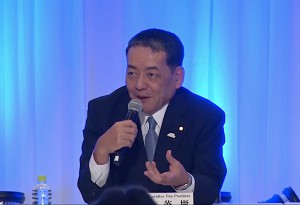
Toyota EVP Shegeki Terashi discusses the automaker's plans to accelerate its BEV program with the media.
Though it was a pioneer in the launch of hybrid technology, Toyota Motor Corp. has long been skeptical of more advanced forms of battery propulsion. But a senior official said today that the largest Japanese automaker now plans to speed up development of plug-ins and pure battery-electric vehicles, or PHEVs and BEVs, so that electrified vehicles account for fully half of its global sales by 2025.
That would be five years ahead of Toyota’s original timetable and reflects the broader industry transition that sees major competitors like Volkswagen and General Motors rapidly accelerating their own electrification efforts.
One of the ways Toyota hopes to get there will be through a new partnership with Subaru that will see them working together to develop a new, dedicated BEV platform.
That said, there could be some obstacles to achieving Toyota’s accelerated target, starting with the challenge of kick-starting demand. Executive Vice President Shigeki Terashi pointed to another concern during a media briefing, warning, “there may be a gap between the amount of batteries we can produce, and the amount of batteries we may need.”
(Toyota launching Hilux production in Myanmar. Click Here for the story.)
It’s been two decades since Toyota launched the first-generation Prius, the world’s first hybrid-electric vehicle. Prius is now in its fourth generation and a broad range of other Toyota models, including the latest version of the brand’s best-selling RAV4 SUV, are offered with hybrid options.
The giant automaker, the world’s second-largest by sales volume, until recently remained cautious about expanding into more advanced battery-based technologies such as PHEVs and BEVs. It did introduce an all-electric version of an earlier-generation RAV4, developed in a partnership with Tesla, but dropped it within a few years. Currently, Toyota only offers one plug-in, the Prius Prime. And instead of any all-electric models it has been focused on the hydrogen-powered Mirai.
Competitors, such as archrival Nissan, have been racing ahead. Volkswagen, in particular, plans to have about 50 different BEVs alone by mid-decade, with its first three long-range models, the VW ID.3, the Audi e-tron and Porsche Taycan, either already on sale or coming to market within the next year. Even Mercedes-Benz is racing into the field, with 10 global plug-ins already available and 10 BEVs to come. The luxury automaker last month began taking orders for its first long-range model, the GLB crossover.
“We consider ourselves as a maker of electric vehicle batteries, going back to when we developed the battery for the Prius,” Terashi said during his Friday briefing. But the automaker was, until recently, focused on older nickel-metal hydride technology. It is now using more advanced lithium-ion batteries in some models, such as the Prius Prime, but officials have continued to voice skepticism. They won’t have a choice once they begin to add more PHEVs and push into the BEV market, lithium being the only effective option now available.
Toyota has broadly hinted that it would like to leap to what is seen as the next-gen technology, dubbed the solid state battery, but few expect that to become commercially available until mid-decade, at the earliest.
(Click Here for our review of the 2020 Toyota GR Supra.)
The good news is that current lithium technology is becoming more energy dense, as well as coming down in price. As a result, GM President Mark Reuss said during a conference last Sunday that he expects BEVs and comparable gas models will “reach parity a lot sooner than people think,” according to a Bloomberg report. That’s in line with some other optimistic forecasts that think this could happen by 2025 – or even sooner.
That said, Terashi warned that it will take some time before battery vehicles generate the same sort of profit margins as conventional products.
The conventional wisdom within the industry, that has led manufacturers to form a wide range of alliances to help spread development costs. Earlier this week, BMW and Jaguar Land Rover formed one such consortium and Ford and Volkswagen have been negotiating another.
Toyota on Thursday said it will partner with Subaru on an EV-only platform for midsize and larger vehicles. The two companies previously teamed up on a sports car now sold as the Subaru BRZ and Toyota 86.
Separately, Toyota has entered a relationship with China’s Contemporary Amperex Technology Co., as well as EV maker BYD to help ensure a steady supply of lithium batteries. That has been a big concern in the industry, Tesla recently indicating it was having trouble getting enough batteries to meet demand both for its BEVs and its stationary power systems.
(To see more about Toyota’s to unleash flood of 19 new products, Click Here.)
Tesla set an industry record for EV sales in 2018 but had seen demand taper off during the first quarter of this year, leading some battery skeptics to question whether there is really demand to justify all the industry’s electrification plans. Tesla is signaling that sales have begun taking off again in recent weeks, however, which could come as good news to officials at Toyota, among other competitors.
